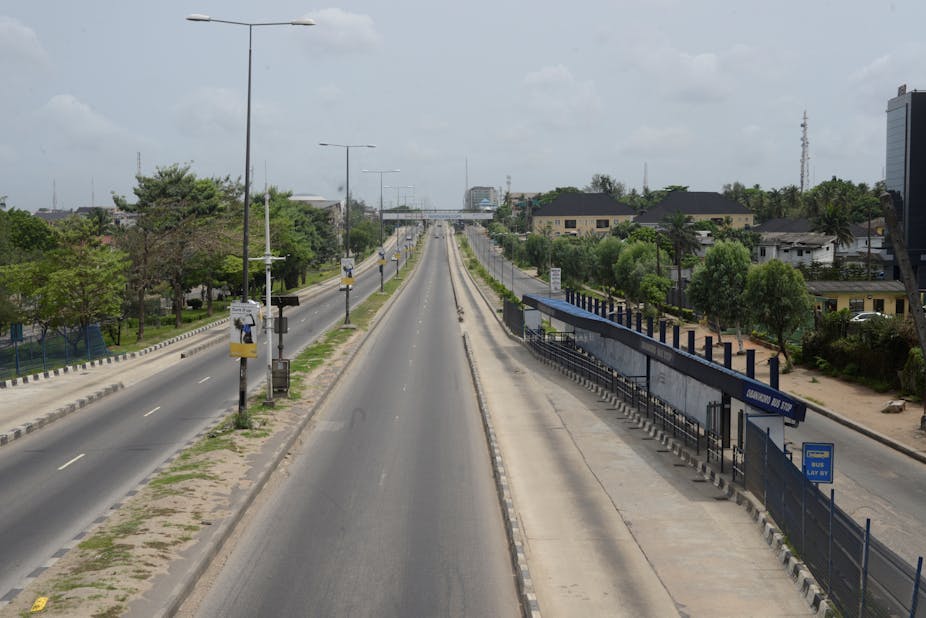During the first wave of the pandemic in Nigeria, security forces were mandated to enforce lockdown and stay-at-home orders. Intended as public health measures, these controls inflicted collateral damage.
The damage included arrests and detention, harassment, extrajudicial killings, destruction of wares, maiming and torture. The controls also trampled on the human rights and economic rights of workers in the informal economy.
Nigeria’s informal economy accounts for 65% of the country’s total GDP and employs more than 90% of the workforce.
About 5.58 million people 2.38 million men and 3.2 million women – make a living in the informal economy of Lagos. This represents about three quarters of the State’s 7.5 million labour force.
These estimates show that a large percentage of Nigeria’s population depends on the informal economy for their livelihood. It follows that the adverse impact of the COVID-19 control measures on informal workers would be huge. The measures are hard on informal workers because they tend to need to work outside the home every day.
Our research focused on violations of human rights of informal workers in Nigeria by state actors. We call for an approach to pandemic control that recognises the nuances of local cultures and social economy.
Studying the state’s actions
We sourced data from the WHO, Nigeria Centre for Disease Control publications portal, policy documents of the Nigerian government, journal and newspaper articles, blog posts from press briefings and media interviews of government officials.
During the lockdown, movements were restricted and we couldn’t conduct face-to-face interviews and surveys. Thus we relied on a desk review of literature on COVID-19 control responses.
At the onset of the first wave of COVID-19 in Nigeria, the government declared a state of emergency. It directed state actors, including security agencies, to take measures necessary to maintain law and order and protect citizens’ lives and property. They were also asked to keep essential public services working, and direct relief materials to the areas of greatest need. State actors enforced restrictions on movement and travel, bans on public gatherings, and closure of markets, businesses and schools.
Despite the warning by the United Nations High Commissioner for Human Rights that states should not violate human rights under the guise of exceptional or emergency measures, some actions of Nigerian security agencies violated the rights of informal workers. Of particular concern were those whose survival depends on daily earnings from outside the home. These include street vendors, petty traders, artisans, cart pushers, waste pickers, commercial motorcycle operators, and roadside motor mechanics.
The pandemic and the related containment measures worsened various forms of social, cultural and economic exclusion and inequality. This strongly affected vulnerable groups like informal workers.
Some states in Nigeria such as Abia, Ekiti, Lagos, Kaduna and Rivers recorded incidents of abuse such as destruction of traders’ wares by security operatives enforcing the lockdown policy. Cases were reported where security agencies were implicated in harassment, killings, maiming and torture.
Public transport services were shut down, leading to loss of income. Informal workers were left with little option than to walk long distances between their homes and places of work. Many who dared to move around were harassed and arrested by the security agencies. These impacts have been captured in media reports.
The lockdown policy severely reduced income-generating activities for informal workers and presented the dilemma of either ‘dying from the virus or dying from hunger’.
Nigeria has a Bill of Rights, and these rights are contained in Chapter IV of the 1999 constitution. They include the right to life, right to dignity, right to personal liberty, right to freedom of movement, and right to freedom of assembly and association. State actors violated these rights under lockdown.
How state actors got it wrong
While the Nigeria Police issued some guidelines on enforcement of COVID-19 control measures, it left room for discretionary use of force.
The guidelines prescribed “use of force when absolutely necessary and to the extent proportionate to achieve the required result and in accordance with existing national legislation.” They didn’t consider the daily income earners who cannot survive without leaving their homes. Consequently, many Nigerians who obeyed the COVID-19 lockdown policy did not have food and income that their families needed.
The lockdown also closed schools and disrupted students’ education. While the children of the elite took online lessons and used digital platforms for learning, the children of informal workers had no such opportunity.
COVID-19 containment programmes raised important legal, constitutional and human rights concerns.
What we suggest
Any future lockdown strategies must consider the risks to both lives and livelihoods. Approaches like lockdown and stay-at-home orders may not benefit societies dominated by informal economies.
We argue that the enforcement of COVID-19 containment policies in Nigeria neglected social structures and the way the local economy works. It undermined the human rights of informal workers who depend on daily social interactions for their livelihood.
The nuances of culture also should be taken into consideration before large scale adoption of these control practices. And security agents need training on human rights as part of effective implementation of COVID-19 containment measures in Nigeria.

